It’s hard to imagine anything wearing down the bravado of Donald Trump, but will his legal troubles play poorly in a general election, leading him to lose again in November 2024?
Or might the current Republican front runner go out a different way?
At present, Trump stands accused of 91 charges in four felony cases, testing his political death-defying ability.
So far, the primary campaign has been a display of Trump’s political impunity, with the former president having dispatched all major challengers, except for Nikki Haley, who’s running 32 points behind him in South Carolina, her home state. That’s the next primary, on Feb. 24.
“He is a tank. He is a boulder. I don't think there is literally anything that can happen to this man that would make him lose because he has such a chokehold on the Republican Party,” said Amani Wells-Onyioha, operations director at Democratic political firm Sole Strategies.
But others still consider him vulnerable to defeat — just not exactly in the way you might think.
RELATED ARTICLE: Prison president: How Donald Trump could serve from behind bars
“There's a very real possibility that he gets convicted of one of these and is looking at prison time,” said Nicholas Creel, assistant professor of business law at Georgia College and State University. “When we get to the hypothetical point of him needing to take office, we've got to figure out now, is he actually above the law. The Supreme Court will have to step in.
“There is a very, very real possibility that a Supreme Court majority — probably a five-four ruling — could say you still have to face the music, Mr. President, and if we enter political paralysis, that's because we have chosen that you would be the president in prison,” Creel continued.
Here are 11 other scenarios where Trump fails for a second straight time to get back to the White House — without losing the 2024 general election:
Trump loses the Republican primary on votes
This is highly unlikely, but not impossible.
Elaine Kamarck of the Brookings Institution, author of “Primary Politics: Everything you need to know about how America nominates its presidential candidates,” notes that even on delegate-rich Super Tuesday, March 5, only two states (Alaska and Colorado) award delegates proportionate to the vote.
The other 13 states and a territory use a different system, which favors Trump.
“The remaining states use some sort of winner take all or winner take most system,” she wrote. “For instance, in delegate rich California, if a candidate wins 50 percent of the vote, they get all the delegates. If not, the delegates are awarded proportionally. In a two-person race Trump is likely to win many delegates.”
Then what is Haley doing?
 Republican presidential candidate, former U.N. Ambassador Nikki Haley, during a campaign event at the Franklin VFW on Jan. 22, 2024, in Franklin, New Hampshire. (Photo by Joe Raedle/Getty Images)
Republican presidential candidate, former U.N. Ambassador Nikki Haley, during a campaign event at the Franklin VFW on Jan. 22, 2024, in Franklin, New Hampshire. (Photo by Joe Raedle/Getty Images)
“In the months before the convention Trump may be convicted of one or more crimes,” she wrote. “It’s hard to predict how his loyal base will react. So far Trump’s indictments have only made them more loyal and there’s no reason to believe that convictions would change their minds. Nonetheless a conviction would certainly play into Haley’s critique of him as the chaos candidate. And she may be thinking she’d be the last person standing.”
Or she’s laying the groundwork for a run in 2028.
Trump loses the GOP nomination in a floor fight
Republicans are saying there’s no chance of this, according to NBC News. Morton Blackwell, a member of the Republican National Committee’s convention rules committee since 1988, said convention rules can be changed but it won’t happen — “absent a cement truck coming around the corner and killing the nominee.”
But James Long, professor of political science at the University of Washington, has said Trump supporters might have to ask themselves some tough questions amid the various indictments and Trump’s increasingly erratic behavior.
“Everyone saying they’re going to support Trump is going to have to face the reality that this is going to get worse and worse for him, and they’re going to have to think about whether or not he’s a credible winner in the (general) election,” Long said. “And they’re going to have to decide if they care more about him as a person, or they care more about winning.”
A recent CNN poll, however, showed Trump ahead of President Joe Biden by four percentage points.
Trump flees the country
As George Washington University law professor Jonathan Turley wrote, Trump “is one of the most recognized figures in the world. He would have to go to Mars to live incognito. It is facially absurd.”
As outlandish as it may sound, Trump could theoretically find refuge from legal threats in a country that’s not so friendly to the United States — but potentially friendly to Trump.
Think Russia. China. Saudi Arabia. Even — dare one say it — North Korea. Unlike most people in legal peril, Trump has massive amounts of money and the physical means — specifically, his own “Trump Force One” Boeing 757 — to get to a place beyond the reach of special counsel Jack Smith, Fulton County District Attorney Fani Willis or the U.S. justice system, writ large.
Trump ally Tucker Carlson, it’s worth noting, was welcomed by Russia to interview President Vladimir Putin at a time when the Russian government has for months detained two American journalists — the Wall Street Journal’s Evan Gershkovich and Radio Free Europe-Radio Liberty editor Alsu Kurmasheva. News organizations and press freedom advocates have roundly condemned the detentions as unjust, with the Wall Street Journal saying that Russia has arbitrarily and wrongfully detained” Gershkovich “for doing his job as a journalist.”
And in addition to the Russias and Chinas of the world, there are dozens of other nations that don’t have extradition treaties with the United States, which makes it extremely difficult for the U.S. law enforcement officials to spirit a wanted man into custody and back to American soil.
 Russian President Vladimir Putin (L) looks at then-President Donald Trump during the welcoming ceremony prior to the G20 Summit's Plenary Meeting on November 30, 2018 in Buenos Aires, Argentina. (Photo by Mikhail Svetlov/Getty Images)
Russian President Vladimir Putin (L) looks at then-President Donald Trump during the welcoming ceremony prior to the G20 Summit's Plenary Meeting on November 30, 2018 in Buenos Aires, Argentina. (Photo by Mikhail Svetlov/Getty Images)
Of course, such a drastic move by Trump would all but guarantee that he could never again return to the United States as a free man.
But Trump has well-established business ties in numerous foreign countries and could ostensibly live like a fugitive king in a welcoming nation.
And in October 2020, days before the election he wouldn’t win, Trump himself floated the idea of becoming an ex-pat: “Could you imagine if I lose? I’m not going to feel so good. Maybe I’ll have to leave the country, I don’t know.”
Said Wells-Onyioha: “If he doesn't want to face charges, I can see him attempting to flee. Trump genuinely feels like the rules don't apply to him, so I think that there's nothing that he won't do. I don't think he wants to face any accountability or any repercussions for any of the things that he's done thus far, so I can see him trying to flee.”
In actuality, it’s much more likely that Trump’s legal team will just try to delay the court proceedings as long as possible, John Geer, dean of the college of arts and science and professor of political science and public policy and education at Vanderbilt University, has said.
“(Trump) can tie the legal system up for a long time, so that’s what I suspect he'll end up doing,” Geer said.
ALSO READ: Bikers for Trump just hit a ditch
Last month, Trump was hit with an $83.3 million verdict by a jury that found Trump liable for defaming a woman — for a second time — about what a previous jury determined was sexual assault.
Trump faces a potentially much larger verdict for what a judge has ruled was fraud involving his business interests in New York. The judge has delayed a verdict on damages after a report that a Trump finance executive planned to plead guilty to perjury.
Trump is scheduled to go on trial March 25 in New York on charges that he falsified financial records to hide payments — prior to being elected President in 2016 — to porn performer Stormy Daniels for staying quiet about an alleged affair.
A March 4 trial date on federal election subversion charges against Trump was delayed for courts to consider Trump’s claim of presidential immunity. A federal appeals court unanimously found no such privilege. The next step is the Supreme Court, which could choose not to take the case and let the appeals court ruling stand.
The start date is uncertain for Trump’s federal trial on charges of illegally retaining classified documents after he left the White House. The judge set a trial date for May but has suggested she might move that back as Trump’s lawyers say they need more time to review “voluminous” evidence.
A Georgia election interference case against Trump is delayed by allegations that the Fulton County District Attorney had a relationship that created a conflict of interest. A hearing is scheduled Feb. 15 on Trump’s motion to dismiss the case over the relationship and alleged financial improprieties.
Trump falls gravely ill or dies of natural causes
When Americans discuss age and the presidency, it’s usually about President Joe Biden, the nation’s first octogenarian commander-in-chief who will be 82 years old on Inauguration Day 2025.
But Trump, 77, is not a young man, either.
Trump turns 78 in June. If elected president this year, Trump would become the oldest president in history at the time he took office, surpassing Biden.
The average age of death for a man who’s served as president of the United States is about 72 years old, according to Statista, and only 12 out of the 45 U.S. presidents have lived to celebrate their 80th birthday.
So while the topic itself is grim, even uncouth, the odds of Trump falling gravely ill or dying before Election Day 2024 are not insignificant.
ALSO READ: Alina Habba is persona non grata at her Pennsylvania law school
What would happen next upon either scenario would largely be a function of the point in time Trump stopped running.
Kamarck has written that state election officials are allowed to adjust filing deadlines for new candidates if the frontrunner dies or is incapacitated. For some of the states that haven’t yet conducted their nominating contests, they could also move back their primaries.
If Trump couldn’t continue after winning enough primary votes to become the presumptive 2024 presidential nominee, the nation would almost certainly gird for a brokered Republican National Convention, which is scheduled for mid-July in Milwaukee, Wis.
And if Trump officially secured the GOP nomination, but couldn’t stand for election in November 2024, a select group of Republican Party bigwigs would likely convene to choose a replacement — whether that was Trump’s vice presidential running mate, or someone else.
Trump dies from assassination
Even more grim is the specter of assassination, an ever-present specter for presidents and presidential candidates alike.
Four presidents — John F. Kennedy, William McKinley, James Garfield and Abraham Lincoln — died after being shot.
Ronald Reagan, in 1981, could have been the fifth assassinated president but for the quick reactions of law enforcement and medical personnel.
Last August, while attempting to serve a warrant, FBI agents shot and killed a Utah man who had allegedly made “credible” threats against Biden.
High-profile presidential candidates also come under threat. The most notable modern example is that of Robert F. Kennedy, who died in 1968 after being shot at a campaign event. (Kennedy’s son, Robert F. Kennedy Jr., is now running for president as an independent, and he has publicly stated that he believes his father’s convicted killer isn’t the man who committed the crime.)
Trump, like every past president and many presidential candidates, receives U.S. Secret Service protection and will ostensibly be entitled to such protection even if he’s convicted of a crime and sent to prison or home detention.
Trump agrees to quit the race before Election Day
Scott Galloway made this prediction on the popular podcast Pivot, which he hosts with journalist Kara Swisher:
Trump, Galloway said last year, "has a very nice life, and his life can be going back to golf and sycophants and having sex with porn stars. … Or he can live under the threat of prison. The [political] momentum he has is real leverage and power. And I think he’s going to cash that leverage and power in for a plea deal that includes no jail time.”
With Trump is facing state charges in Georgia and New York, he wouldn’t be able to escape by pardoning himself as president — something he could attempt to do for the federal-level charges he faces. Therefore, Trump’s calculus may change.
Creel noted Spiro Agnew’s resignation from the vice presidency in 1973 after facing the threat of jail for his corruption while governor of Maryland.
“One of the parts of the agreement was [to] resign, get out of politics forever, and we will not pursue this,” he said. “So with a more rational defendant, that would absolutely be something that's on the table. That's something Jack Smith would be bringing to Trump, but for one, we're not dealing with a particularly rational individual. Two, this scenario is significantly different in that we have state-level charges also facing him. And so because they can't really immunize him against that at the state level, the incentive to take that sort of a deal is greatly diminished.”
Wells-Onyioha said Trump maybe – maybe – would come to the realization that prison, and the potential life-long loss of his freedom, is a real and unpalatable possibility.
“I can see them coming up with some sort of like plea agreement, where in exchange for dropping out of the race, they will let him be on probation or something like that,” she said. “I can see that happening. But even so, I'm not even sure if he would take that deal.”
Trump is removed via the 25th Amendment
The Constitution’s 25th Amendment spells out the succession plan if a president dies or is removed from office, which means the vice president takes over.
If the vice president and his cabinet determine that the president is unable to discharge his duties as president — say, being in prison — Congress will have 48 hours to convene and 21 days to decide if the president is fit to hold office. It can remove him by a two-thirds vote.
“You can even see his cabinet exercising the 25th Amendment, saying, look, you're incapacitated. You're not capable because you're needing to go to prison or are in prison. You're not capable of fulfilling the oath of office, therefore, we're invoking [the] 25th Amendment and removing you from office that way, and so you would see whoever his vice president elect is [at] that point stepping up,” Creel said.
If Trump wins the 2024 election, the Supreme Court will ultimately need to decide if a sitting president is immune from state-level prosecution in Georgia and New York, and the Court might rule against his ability to serve as president.
 Supreme Court 2022, Image via Fred Schilling, Collection of the Supreme Court of the United States
Supreme Court 2022, Image via Fred Schilling, Collection of the Supreme Court of the United States
“Functionally this would mean Trump is the legitimate president but would still be forced to carry out a sentence in a state prison,” Creel said. “In that scenario, it’s difficult to see how he wouldn’t be either impeached and convicted or otherwise removed via the 25th Amendment due to his ‘incapacity.’”
But with a third of the Supreme Court being Trump appointees, Svante Myrick, president of People For the American Way and former mayor of Ithaca, N.Y., said he could see the Court ruling in Trump’s favor and allowing him to serve any legal consequences at a later time.
“Uncharted legal territory with stakes this high means questions like that usually get kicked up to the Supreme Court. Given that, Donald Trump appointed three members of the Supreme Court on a six-person ultra conservative majority, I think the most likely scenario is that he's allowed to stand for office, and if he wins, he could avoid or at least delay paying his debt to society,” Myrick said.
The 25th Amendment could also be used for a president’s mental competence. While Trump attacks Biden for being “cognitively impaired,” Trump is 77 years old and isn’t always sharp himself. He said last year Biden would lead the U.S. into “World War II” and, in the same speech, said he was leading former President Barack Obama in polls for the 2024 election.
Amid Trump’s continued gaffes this year, Haley has called him “confused” and has tried to use the issue to bait him into appearing with her in a debate.
Trump has the 14th Amendment applied to him
The U.S. Supreme Court heard arguments Feb. 8 on whether the Constitution’s 14th Amendment and its “insurrectionist ban” makes Trump disqualified from holding office because of his actions on Jan. 6, 2021.
Colorado’s Supreme Court held in a 4-3 decision in December that the ban does apply to Trump.
Maine’s secretary of state came to the same conclusion, but a court has ordered that the issue be reconsidered after the U.S. Supreme Court decision.
Some other states rejected legal intervention on procedural grounds.
The 14th Amendment, in part, bans anyone who “engaged in insurrection” against the United States from holding any civil, military or elected office without the approval of two-thirds of the House and Senate.
“Donald Trump cannot be president — cannot run for president, cannot become president, cannot hold office — unless two-thirds of Congress decides to grant him amnesty for his conduct on Jan. 6,” William Baude, a professor of law at the University of Chicago, has said.
The 14th Amendment originally intended to prevent Confederate officials from gaining power after the Civil War, but how the disqualification clause would be applied is unclear to legal experts, especially since it’s never been used in the case of a president before, FindLaw, a Reuters company, reported.
Trump is impeached for a third time, then convicted and disqualified from serving as president
If the Supreme Court does say “nobody's above the law, and that includes the president” and lets the criminal justice system do its work, Creel said, Trump could still be disqualified from the presidency via the political system.
“We have a blueprint for how to do that. Impeachment. Conviction. Removal. That's how you could do it, and so you can see him taking office and having that avenue, where he's president for a day and then they just kind of have this perfunctory removal,” Creel said.
Trump was twice impeached while in office, but was acquitted on all counts by the Senate in both cases.
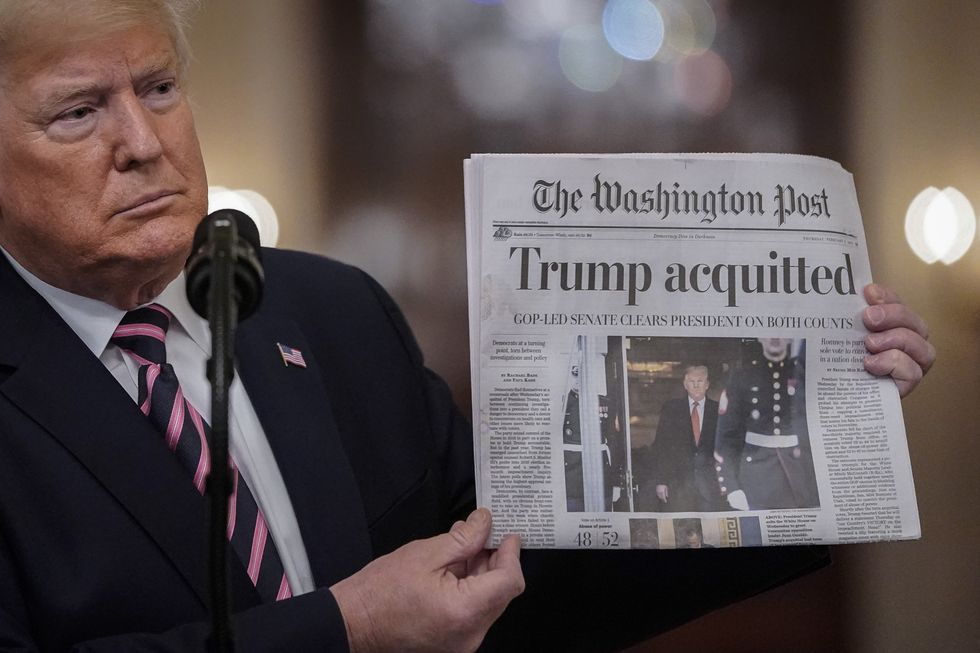 Then-President Donald Trump holds a copy of The Washington Post as he speaks in the East Room of the White House one day after the U.S. Senate acquitted on two articles of impeachment, ion February 6, 2020 in Washington. (Photo by Drew Angerer/Getty Images)
Then-President Donald Trump holds a copy of The Washington Post as he speaks in the East Room of the White House one day after the U.S. Senate acquitted on two articles of impeachment, ion February 6, 2020 in Washington. (Photo by Drew Angerer/Getty Images)
Congress could technically impeach Trump now with the goal of simply disqualifying him from running for elected office. Recall that Trump’s second impeachment trial took place several weeks after he left the White House.
But with Republicans currently controlling the House, where any impeachment proceeding would begin, such a scenario is exceedingly remote.
Trump accepts pardon promise with the understanding that he’ll quit the race
An exotic and unlikely scenario is Biden pardoning Trump with the understanding that Trump will quit the presidential race.
Biden, who has recently stepped up his criticism of Trump, has never spoken of such an idea.
A most imperfect historical parallel would be President Gerald Ford’s pardoning of President Richard Nixon after Nixon resigned amid the Watergate scandal. But there’s no evidence Ford’s pardon involved either an overt or secret quid pro quo, according to the National Constitution Center, and came only after Nixon had officially stepped down.
Also: Could Trump serve as president while set to serve time?
In short: yes.
There’s precedent that presidents don’t have full legal immunity — look at the 1997 Supreme Court ruling in Clinton v. Jones, Creel says — but Trump could be still allowed to serve any prison time post-presidency if convicted and sentenced for any of the 91 charges.
That would require the Supreme Court ruling that Trump couldn’t have his presidential duties interfered with by state level charges.
“We have to just set them aside to the point where he could realistically, in that scenario if that's what the Supreme Court says, be told January 20, at 12:01 p.m., 2028, report for incarceration in the state of Georgia,” Creel said. “That's an actual realistic possibility that could go his way.”
From Your Site Articles
Related Articles Around the Web

 Source: Donald Trump campaign
Source: Donald Trump campaign Source: Donald Trump campaign
Source: Donald Trump campaign Source: Donald Trump campaign
Source: Donald Trump campaign Source: Donald Trump campaign
Source: Donald Trump campaign Source: Donald Trump campaign
Source: Donald Trump campaign Source: Donald Trump campaign
Source: Donald Trump campaign Source: Donald Trump campaign
Source: Donald Trump campaign Source: Donald Trump campaign
Source: Donald Trump campaign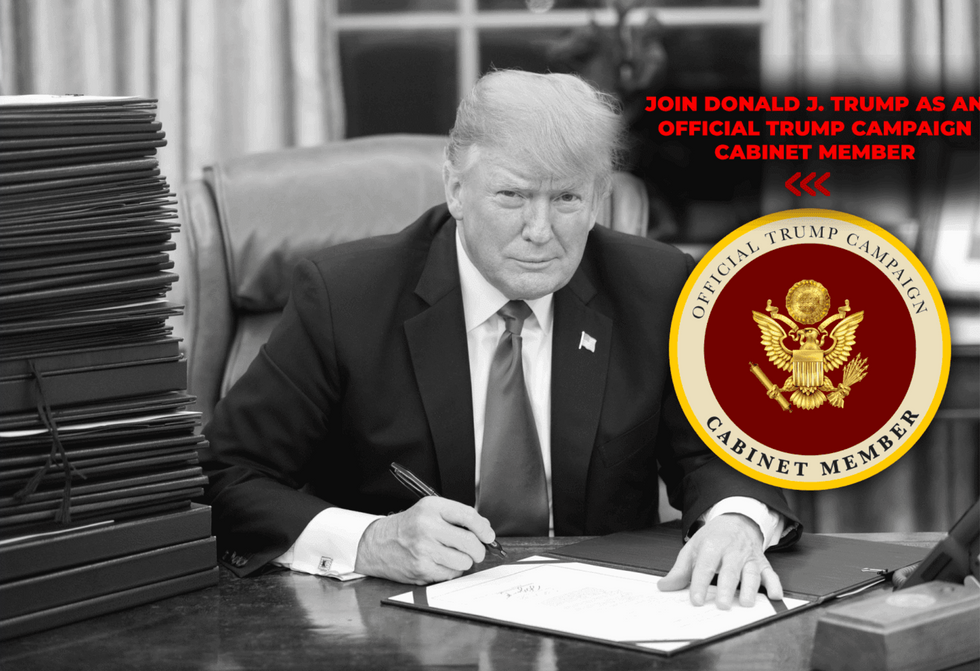 Source: Donald Trump campaign
Source: Donald Trump campaign Source: Donald Trump campaign
Source: Donald Trump campaign Source: Donald Trump campaign
Source: Donald Trump campaign Source: Donald Trump campaign
Source: Donald Trump campaign Source: Donald Trump campaign
Source: Donald Trump campaign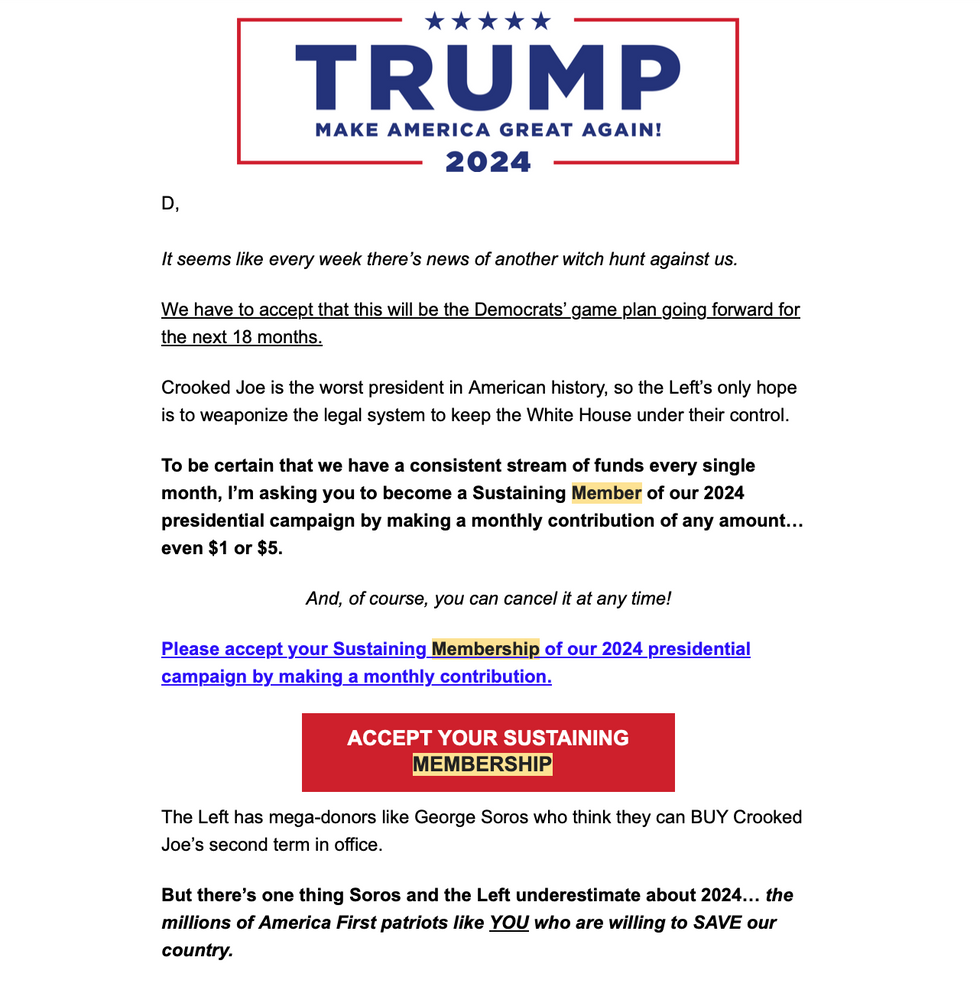 Source: Donald Trump campaign
Source: Donald Trump campaign Source: Donald Trump campaign
Source: Donald Trump campaign Source: Donald Trump campaign
Source: Donald Trump campaign Source: Donald Trump campaign
Source: Donald Trump campaign Source: Donald Trump campaign
Source: Donald Trump campaign Source: Donald Trump campaign
Source: Donald Trump campaign Source: Donald Trump campaign
Source: Donald Trump campaign Source: Donald Trump campaign
Source: Donald Trump campaign Source: Donald Trump campaign
Source: Donald Trump campaign Source: Donald Trump campaign
Source: Donald Trump campaign Source: Donald Trump campaign
Source: Donald Trump campaign Source: Donald Trump campaign
Source: Donald Trump campaign Source: Donald Trump campaign
Source: Donald Trump campaign Source: Donald Trump campaign
Source: Donald Trump campaign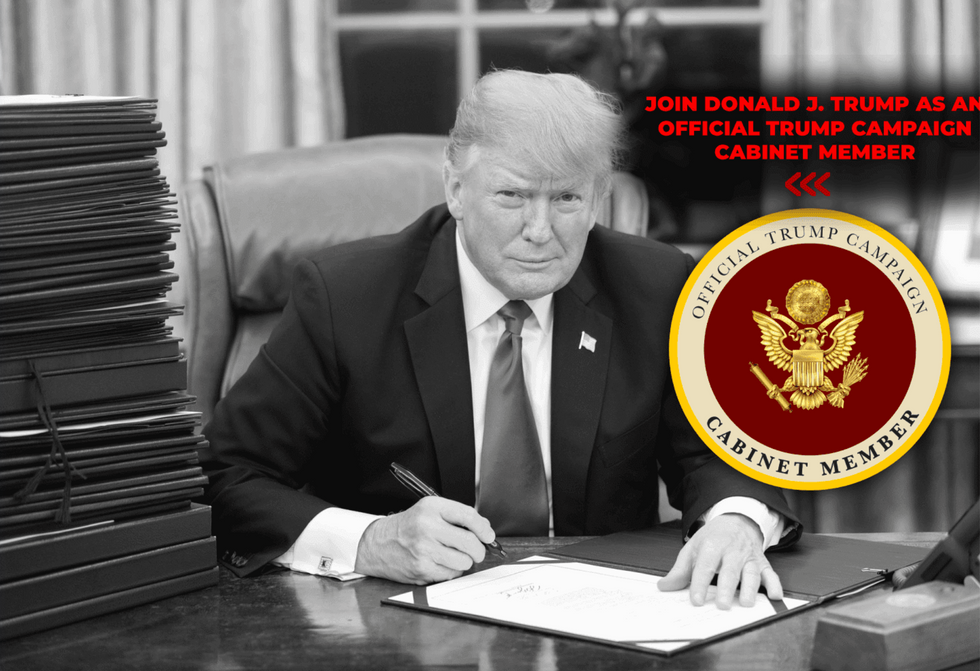 Source: Donald Trump campaign
Source: Donald Trump campaign Source: Donald Trump campaign
Source: Donald Trump campaign

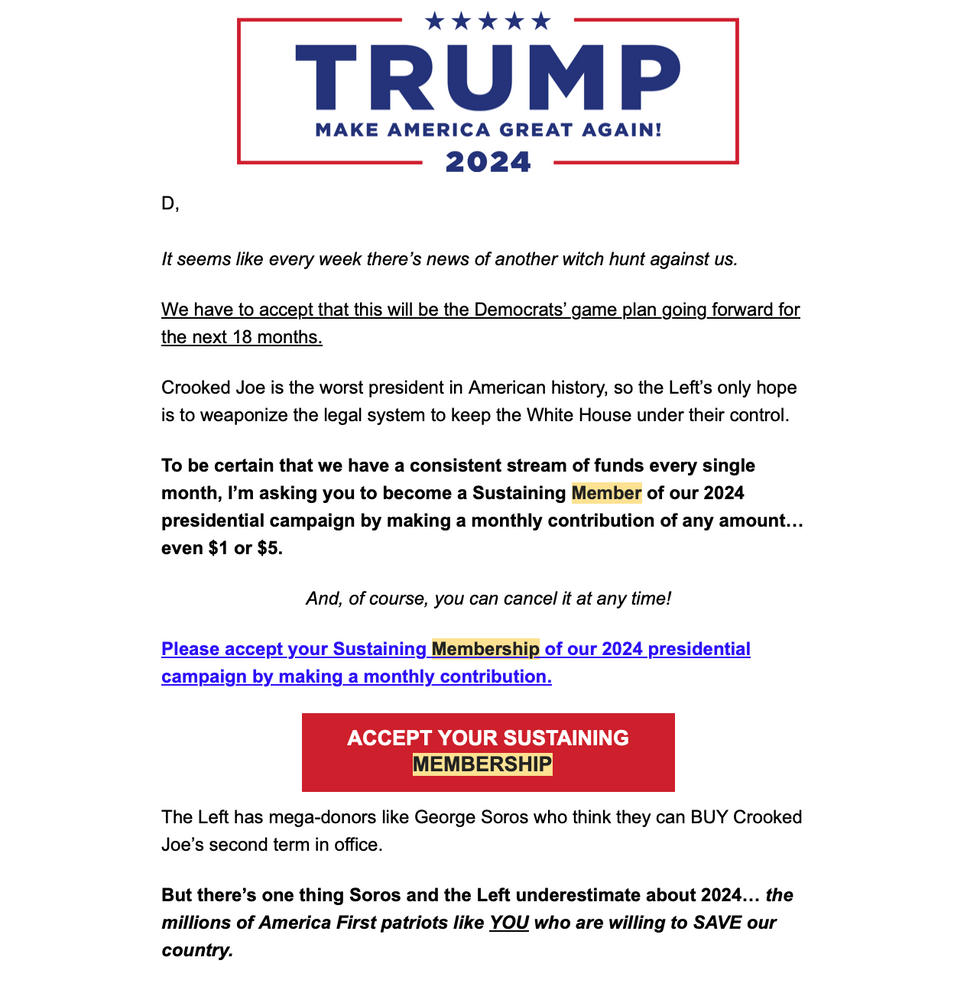
 Source: Donald Trump campaign
Source: Donald Trump campaign Source: Donald Trump campaign
Source: Donald Trump campaign Republican presidential candidate, former U.N. Ambassador Nikki Haley, during a campaign event at the Franklin VFW on Jan. 22, 2024, in Franklin, New Hampshire. (Photo by Joe Raedle/Getty Images)
Republican presidential candidate, former U.N. Ambassador Nikki Haley, during a campaign event at the Franklin VFW on Jan. 22, 2024, in Franklin, New Hampshire. (Photo by Joe Raedle/Getty Images) Russian President Vladimir Putin (L) looks at then-President Donald Trump during the welcoming ceremony prior to the G20 Summit's Plenary Meeting on November 30, 2018 in Buenos Aires, Argentina. (Photo by Mikhail Svetlov/Getty Images)
Russian President Vladimir Putin (L) looks at then-President Donald Trump during the welcoming ceremony prior to the G20 Summit's Plenary Meeting on November 30, 2018 in Buenos Aires, Argentina. (Photo by Mikhail Svetlov/Getty Images) Supreme Court 2022, Image via Fred Schilling, Collection of the Supreme Court of the United States
Supreme Court 2022, Image via Fred Schilling, Collection of the Supreme Court of the United States  Then-President Donald Trump holds a copy of The Washington Post as he speaks in the East Room of the White House one day after the U.S. Senate acquitted on two articles of impeachment, ion February 6, 2020 in Washington. (Photo by Drew Angerer/Getty Images)
Then-President Donald Trump holds a copy of The Washington Post as he speaks in the East Room of the White House one day after the U.S. Senate acquitted on two articles of impeachment, ion February 6, 2020 in Washington. (Photo by Drew Angerer/Getty Images)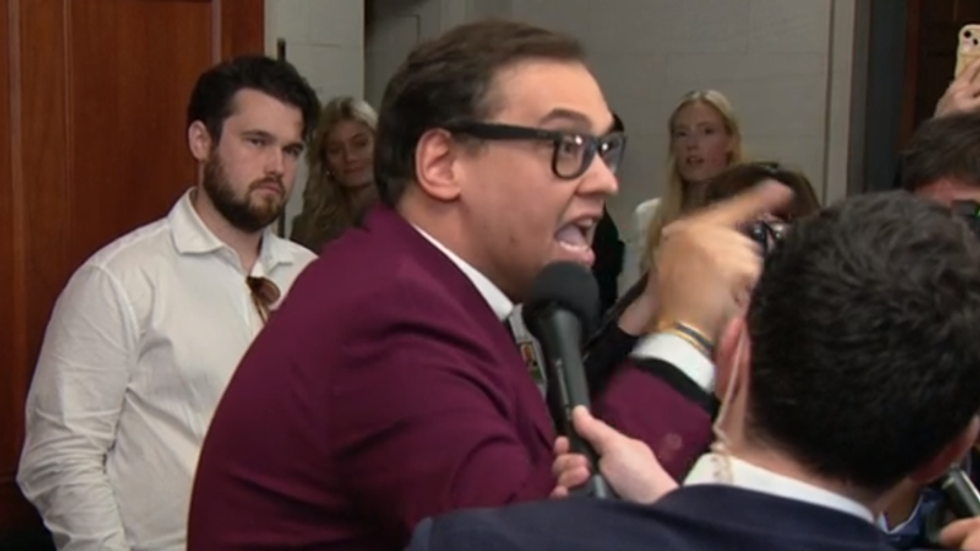 George Santos yelling at reporters (C-SPAN).
George Santos yelling at reporters (C-SPAN).  A sales page for Winning Team Publishing, co-founded by Donald Trump Jr., which offers a Donald Trump-themed "official calendar" for $14.99 plus shipping. The calendar does not include historical details about January 6, unlike what it offers for other dates. Source: Winning Team Publishing
A sales page for Winning Team Publishing, co-founded by Donald Trump Jr., which offers a Donald Trump-themed "official calendar" for $14.99 plus shipping. The calendar does not include historical details about January 6, unlike what it offers for other dates. Source: Winning Team Publishing Donald Trump's presidential campaign is also selling a calendar — this one is available to people who make a $47 campaign donation. Source: DonaldTrump.com
Donald Trump's presidential campaign is also selling a calendar — this one is available to people who make a $47 campaign donation. Source: DonaldTrump.com The top of a daily "Important Articles and Posts from President Trump" email that Donald Trump's 2024 campaign began sending out last week. Screengrab
The top of a daily "Important Articles and Posts from President Trump" email that Donald Trump's 2024 campaign began sending out last week. Screengrab Source: The Citadel emails obtained through a South Carolina Freedom of Information Act request.
Source: The Citadel emails obtained through a South Carolina Freedom of Information Act request. Source: The Citadel emails obtained through a South Carolina Freedom of Information Act request.
Source: The Citadel emails obtained through a South Carolina Freedom of Information Act request. Incoming freshman march at The Citadel, The Military College of South Carolina on August 19, 2013 in Charleston, South Carolina. The Citadel, which began in 1842, has about 2,300 undergraduate students. Richard Ellis/Getty Images
Incoming freshman march at The Citadel, The Military College of South Carolina on August 19, 2013 in Charleston, South Carolina. The Citadel, which began in 1842, has about 2,300 undergraduate students. Richard Ellis/Getty Images Rudy Giuliani signs and autograph for The Citadel graduate Creighton Nash after the graduation ceremony on May 5, 2007, in Charleston, S.C. Stephen Morton/Getty Images
Rudy Giuliani signs and autograph for The Citadel graduate Creighton Nash after the graduation ceremony on May 5, 2007, in Charleston, S.C. Stephen Morton/Getty Images Rep. James Clyburn (D-SC) speaks during a dedication ceremony for a new statue of Pierre L'Enfant at the U.S. Capitol on February 28, 2022. Pierre L'Enfant was a French-American military engineer who designed the initial urban plan for Washington, DC. (Photo by Drew Angerer/Getty Images)
Rep. James Clyburn (D-SC) speaks during a dedication ceremony for a new statue of Pierre L'Enfant at the U.S. Capitol on February 28, 2022. Pierre L'Enfant was a French-American military engineer who designed the initial urban plan for Washington, DC. (Photo by Drew Angerer/Getty Images) Gays for Trump leader Peter Boykin speaks at a rally on the National Mall on Sept. 16, 2017, in Washington, D.C. Courtesy: C-SPAN
Gays for Trump leader Peter Boykin speaks at a rally on the National Mall on Sept. 16, 2017, in Washington, D.C. Courtesy: C-SPAN Republican National Committee / Nikki Haley for President fundraising email from the night former President Donald Trump was federally indicted. (Email screenshot)
Republican National Committee / Nikki Haley for President fundraising email from the night former President Donald Trump was federally indicted. (Email screenshot) William Saletan (l), Tucker Carlson (c) and C-SPAN host Lew Ketcham (r) appear on "Saturday Journal" the morning of Dec. 30, 1995.
William Saletan (l), Tucker Carlson (c) and C-SPAN host Lew Ketcham (r) appear on "Saturday Journal" the morning of Dec. 30, 1995. Then-Republican presidential candidate Rudy Giuliani (center) receives an honorary degree of doctor of public administration from Citadel Associate Provost Isaac Metts (right) on May 5, 2007. Stephen Morton/Getty Images
Then-Republican presidential candidate Rudy Giuliani (center) receives an honorary degree of doctor of public administration from Citadel Associate Provost Isaac Metts (right) on May 5, 2007. Stephen Morton/Getty Images